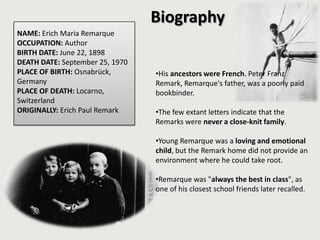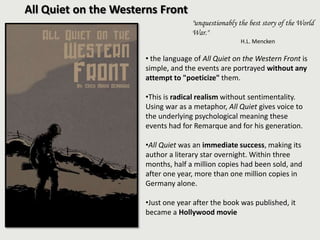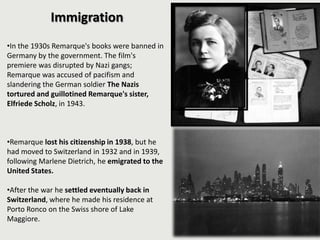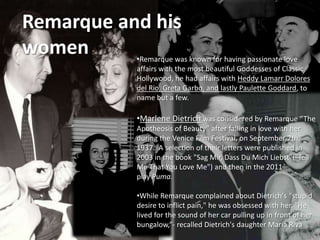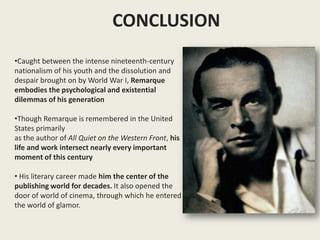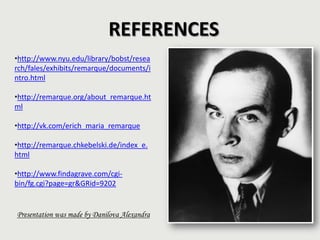Erich Maria Remarque
- 1. ERICH MARIA REMARQUE The quintessential twentieth- century man â-Why does a man live? -In order to think about it..â (E.M. Remarque Arch of Triumph)
- 2. NAME: Erich Maria Remarque OCCUPATION: Author BIRTH DATE: June 22, 1898 DEATH DATE: September 25, 1970 PLACE OF BIRTH: OsnabrÞck, Germany PLACE OF DEATH: Locarno, Switzerland ORIGINALLY: Erich Paul Remark âĒHis ancestors were French. Peter Franz Remark, Remarque's father, was a poorly paid bookbinder. âĒThe few extant letters indicate that the Remarks were never a close-knit family. âĒYoung Remarque was a loving and emotional child, but the Remark home did not provide an environment where he could take root. âĒRemarque was "always the best in class", as one of his closest school friends later recalled. Biography
- 3. THE FIRST WORLD WAR âI am young, I am twenty years old; yet I know nothing of life but despair, death, fear, and fatuous superficiality cast over an abyss of sorrow. I see how peoples are set against one another, and in silence, unknowingly, foolishly, obediently, innocently slay one another.â ( Erich Maria Remarque, All Quiet on the Western Front) âĒRemarque was conscripted into the army at the age of 18. On 12 June 1917, he was transferred to the Western Front âĒIn Flanders he witnessed the start of the offensive known as Third Ypres battle âĒRemarque was wounded by British forces at Dixmunde and the rest of the war he spent virtually in a military hospital in Duisburg went through difficulties and the horrors of war, Remarque wrote his best-known novel All Quiet on the Western Front
- 4. All Quiet on the Westerns Front "unquestionably the best story of the World War." H.L. Mencken âĒ the language of All Quiet on the Western Front is simple, and the events are portrayed without any attempt to "poeticize" them. âĒThis is radical realism without sentimentality. Using war as a metaphor, All Quiet gives voice to the underlying psychological meaning these events had for Remarque and for his generation. âĒAll Quiet was an immediate success, making its author a literary star overnight. Within three months, half a million copies had been sold, and after one year, more than one million copies in Germany alone. âĒJust one year after the book was published, it became a Hollywood movie
- 5. The effect of All quite on Western front âĒ it brought to the author sudden wealth and he never again experienced financial difficulties. He bought himself a fancy car and a house in Porto Ronco, Switzerland Not that Remarque doubted his ability to plot a good novel, but he never quite believed he deserved the literary stature attributed to him after his "first" novel. âLife did not intend to make us perfect. Whoever is perfect belongs in a museum. â Erich Maria Remarque
- 6. OTHER WORKS
- 7. List of works (1920) The Dream Room (1928) Station at the Horizon (written 1924, published 1998) Gam (1931) The Road Back 1929) All Quiet on the Western Front (1936) Three Comrades (1939) Flotsam 1945) : Arch of Triumph (1952) Spark of Life (1954) A Time to Love and a Time to Die (1956) The Black Obelisk (1961) Heaven Has No Favorites (1962) The Night in Lisbon (1970) The Promised Land (1971) Shadows in Paradise
- 8. Immigration âĒIn the 1930s Remarque's books were banned in Germany by the government. The film's premiere was disrupted by Nazi gangs; Remarque was accused of pacifism and slandering the German soldier The Nazis tortured and guillotined Remarque's sister, Elfriede Scholz, in 1943. âĒRemarque lost his citizenship in 1938, but he had moved to Switzerland in 1932 and in 1939, following Marlene Dietrich, he emigrated to the United States. âĒAfter the war he settled eventually back in Switzerland, where he made his residence at Porto Ronco on the Swiss shore of Lake Maggiore.
- 9. Remarque and his women âĒRemarque was known for having passionate love affairs with the most beautiful Goddesses of Classic Hollywood, he had affairs with Heddy Lamarr Dolores del Rio, Greta Garbo, and lastly Paulette Goddard, to name but a few. âĒMarlene Dietrich was considered by Remarque âThe Apotheosis of Beautyâ after falling in love with her during the Venice Film Festival, on September 7th, 1937. A selection of their letters were published in 2003 in the book "Sag Mir, Dass Du Mich Liebst"("Tell Me That You Love Me") and then in the 2011 play Puma. âĒWhile Remarque complained about Dietrich's "stupid desire to inflict pain," he was obsessed with her. "He lived for the sound of her car pulling up in front of her bungalow,â- recalled Dietrich's daughter Maria Riva
- 10. CONCLUSION âĒCaught between the intense nineteenth-century nationalism of his youth and the dissolution and despair brought on by World War I, Remarque embodies the psychological and existential dilemmas of his generation âĒThough Remarque is remembered in the United States primarily as the author of All Quiet on the Western Front, his life and work intersect nearly every important moment of this century âĒ His literary career made him the center of the publishing world for decades. It also opened the door of world of cinema, through which he entered the world of glamor.


